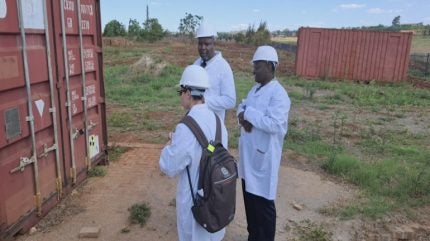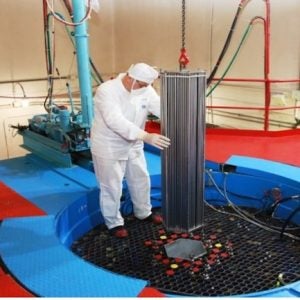
An International Atomic Energy Agency (IAEA) International Physical Protection Advisory Service (IPPAS) team of experts has concluded a mission in Zimbabwe, conducted at the request of the government. Zimbabwe uses nuclear science and technology for peaceful purposes in various sectors, including health, industry, mining, agriculture, education and research.
The seven-person IPPAS mission, hosted by the Radiation Protection Authority of Zimbabwe (RPAZ), was led by Kouame Remi Adjoumani from Côte d’Ivoire, and included experts from Canada, Egypt, Türkiye, the US and Zambia, as well as one IAEA staff member. The team held discussions with officials from the RPAZ, the Office of the President and Cabinet, the Ministries of Health and Childcare, Defence, Transport and Infrastructure Development, as well as the Zimbabwe Defence Forces, the Zimbabwe Republic Police, the Zimbabwe Revenue Authority, the National Nuclear Security Committee, the Airports Company of Zimbabwe, among others.
The mission reviewed Zimbabwe’s nuclear security regime for radioactive material, associated facilities and activities, and the implementation of the Amendment to Convention on the Physical Protection of Nuclear Material (CPPNM). Zimbabwe accepted the 2005 Amendment to the CPPNM in 2023. This amendment significantly enhances the original CPPNM by broadening its scope and establishing obligations for parties to ensure the physical protection of all nuclear facilities and nuclear material used for peaceful purposes, whether in domestic use, storage or transport.
The scope also reviewed the legislative and regulatory framework for the security of radioactive material; regulatory practices in licensing, inspection and enforcement; and coordination between stakeholders involved in nuclear security. The IPPAS team visited the Radiotherapy Centre of the Parirenyatwa Group of Hospitals in Harare, the radioactive waste management facility of the RPAZ in Harare, the Bindura Nickel Corporation in Bindura, and the Mpilo Central Hospital in Bulawayo.
The team observed that the nuclear security regime in Zimbabwe is being established and provided recommendations and suggestions to support Zimbabwe in enhancing and sustaining nuclear security. Good practices were identified that can serve as examples to other IAEA member states to help strengthen their nuclear security activities.
“The completion of the first IPPAS mission in Zimbabwe signals the start of a new phase for nuclear security in the country,” said Elena Buglova, Director of the IAEA Division of Nuclear Security, adding that “the implementation of the mission findings will drive improvements, which will strengthen various aspects of the national nuclear security regime.”
Justice Chipuru, CEO of RPAZ said the IPPAS mission was a significant milestone in Zimbabwe’s efforts to strengthen the national nuclear security framework and measures and was a testament to the government’s commitment to global nuclear security. “We are keen to learn and receive recommendations from fellow regional and international experts and the IAEA,” he said. “We commit to implementing the mission recommendations to provide assurance of the security of sources at facilities and continuing cooperation with the Agency.”






